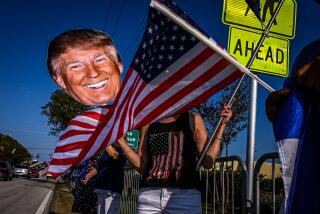Bush’s Prime-Time Debut Capitalizes on Popularity
- Share via
WASHINGTON — As political theater, President Bush’s first prime-time televised press conference--not held until nearly five months into his presidency--seemed curious fare.
After waiting so long, the staging was modest, the expectations downplayed. Even Ronald Reagan’s impressive walk down the center hallway of the main floor of the White House was gone. Bush entered from the side door.
And, when it was over Thursday night, why Bush had chosen now to hold his first evening press conference remained unclear. Bush delivered no opening statement, and he had already made clear what seemed to be his primary message, about China, during an informal meeting with the press on Monday.
Perhaps the most distinguishing factor of the President’s prime-time debut was that the months of preparing this show, during dozens of informal sessions with the White House press corps away from the camera, clearly seemed to pay off in good will for the President.
A reporter from the Independent Network News offered the First Lady birthday greetings. And a CNN reporter, almost beseechingly, asked Bush what overall point the President was trying to make about China.
As one journalist said after leaving the session, about the most exciting thing that happened was when an unnamed Polish reporter jumped to his feet and shouted a question to Bush about the recent elections in his country.
White House officials have insisted for months that the President had not yet addressed the nation in prime time because no occasion called for it.
That has drawn some criticism. Some, including former Reagan Administration sources, have argued that Bush needed to start making more visible statements to the American people if he wants to make clear his vision for the country.
They noted that Bush generally is making far less news than his predecessors, including Jimmy Carter and Gerald R. Ford.
Administration officials argued this week that they had chosen Thursday for his prime-time debut to take “full advantage” of Bush’s major arms reduction proposal during the NATO meeting last week.
But, in retrospect, it seemed equally plausible that Bush simply wanted to pick a time that was fail-safe, when his popularity was high after the NATO meeting and when events in China and on Capitol Hill dominated the news.
Bush clearly had prepared better than he generally does before facing reporters. His daytime sessions sometimes are last-minute decisions to pop into the White House press room.
But for prime time he came armed with prepared answers and even a couple of anecdotes, although they were not the stuff of legendary storytelling: “When our cars went out to the university to pick up some of the students and bring them out,” Bush said, presumably referring to cars picking up American students in China, “they were met by universal applause.”
Bush scrupulously tried to avoid his habit of using acronyms and abbreviations for technical terms. “It is my fervent hope that the OAS will stay with--the Organization of American States--will stay with their mission” in Panama, he said, correcting himself.
“And let me repeat an important point here,” he said. “I think there is some feeling in Panama that we are against the PDF, the Panama Defense Forces. We have no argument with the PDF.”
More to Read
The biggest entertainment stories
Get our big stories about Hollywood, film, television, music, arts, culture and more right in your inbox as soon as they publish.
You may occasionally receive promotional content from the Los Angeles Times.










